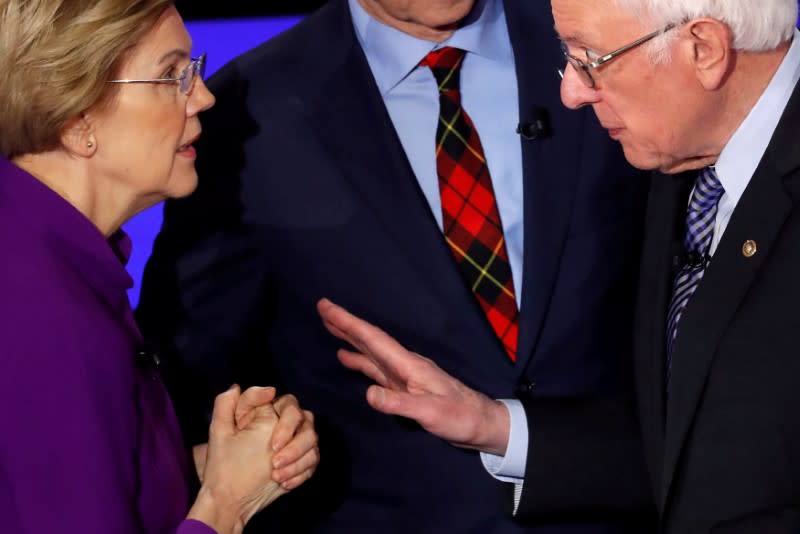Warren, Sanders try to move past feud as early voters sound alarm
By Amanda Becker and Simon Lewis
DES MOINES, IOWA/MANCHESTER, N.H. (Reuters) - U.S. Senators Elizabeth Warren and Bernie Sanders attempted over the weekend to tamp down a weeklong disagreement over whether Sanders told Warren in a 2018 private meeting that a woman could not beat Republican President Donald Trump in 2020.
As the two senators and long-time allies campaigned in the early voting states of Iowa and New Hampshire just two weeks before the first caucuses begin, both largely stuck to their liberal policy platforms and emphasized unity among Democrats hoping to take on Trump in the November election.
"Bernie and I have been friends a long time. We fight for the same issues," Warren said at a house party in Des Moines, Iowa, on Saturday, when quizzed by a supporter who said she believed Warren's side of the story. "That's all I want to say about that topic because what I truly believe is we're going to have to pull together."
Sanders pledged to come together with other Democrats to back their eventual nominee.
"No matter who wins this hotly contested primary, all of us will unite," he said in Exeter, New Hampshire, on Saturday.
"The media has blown this thing up and I don’t want to get into it anymore, other than to say of course that I always believed and believe today that a woman can be elected president of the United States," Sanders told New Hampshire Public Radio on Sunday. "And trust me, if I’m not the nominee and a woman is, I will do everything I can to make sure she is elected."
The two senators have been at odds in recent days after Warren said Sanders told her during the meeting that a woman could not win the presidency in November 2020, which Sanders has denied.
The spat bubbled to the fore during last week's presidential debate in Iowa, when a CNN microphone caught Warren telling Sanders he made her out to be a liar on national television.
The disintegration of the non-aggression pact between the two friends - and the resulting online backlash from supporters in both camps - caused hand-wringing among progressive groups, which urged backers of the two candidates to reserve their fire for centrist rivals.
Sanders is leading Warren in most national opinion polls but both trail behind former Vice President Joe Biden, a moderate.
Interviews with more than 20 voters who attended the two progressives' events on Friday and Saturday showed that they largely wanted the candidates to move on.
Sue Foecke, 40, attended the Des Moines house party hosted by Planned Parenthood Action Fund, and plans to support Warren. But she said a continued focus on the 2018 meeting "doesn't add anything to the conversation."
Though Foecke said she does not have a backup candidate because Warren should be viable in Iowa's caucuses and able to win delegates, some at Warren's events named Sanders as their second choice.
"It breaks my heart," said Kathy Staub, 62, a Sanders backer who is involved in local politics in Manchester.
Staub likes both candidates but contrasted Sanders' history as a grassroots organizer with Warren's more recent emergence as a leading progressive with "policy wonk" plans.
Warren repeatedly demurred when she was asked by reporters about the scuffle, responding: "I don't have anything else to say on this."
Even as the controversy with Warren died down, however, Sanders' campaign has zeroed in on Biden. It criticized Biden's 2002 vote for the Iraq War, which Sanders opposed, and accused him of in the past supporting cutting Social Security benefits for the elderly, which Biden denied. The former vice president's campaign accused Sanders staffers of lying.
(Reporting by Amanda Becker in Des Moines and Simon Lewis in Manchester; Editing by Soyoung Kim, Andrea Ricci and Lisa Shumaker)

 Yahoo News
Yahoo News 

